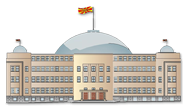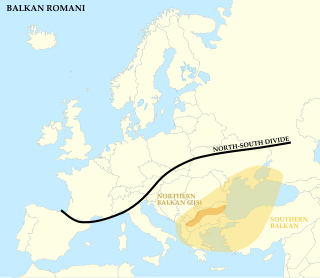
Politics in North Macedonia occur within the framework of a parliamentary representative democratic republic, whereby the Prime Minister is the head of government, and of a multi-party system. Executive power is exercised by the government. Legislative power is vested in both the government and parliament. The Judiciary is independent of the executive and the legislature. The Economist Intelligence Unit rated North Macedonia a "flawed democracy" in 2022.

The Romani, also spelled Romany or Rromani and colloquially known as the Roma, are an ethnic group of Indo-Aryan origin who traditionally lived a nomadic, itinerant lifestyle. Linguistic and genetic evidence suggests that the Romani originated in the Indian subcontinent, in particular the region of present-day Rajasthan. Their subsequent westward migration, possibly in waves, is now believed by historians to have occurred around 1000 CE. Their original name is from the Sanskrit word डोम, ḍoma and means a member of the Dom caste of travelling musicians and dancers. The Roma population moved west into the Ghaznavid Empire and later into the Byzantine Empire. The Roma are thought to have arrived in Europe around the 13th to 14th century. Although they are widely dispersed, their most concentrated populations are located in Bulgaria, Hungary, Romania, Spain, and Turkey.
The Ashkali, otherwise known as Hashkali and/or Balkan Egyptians, are Albanian-speaking Muslim ethnic cultural minorities, which mainly inhabit Kosovo and southern Serbia, as well as Albania, Montenegro, and North Macedonia. Prior to the Kosovo War of 1999, the Balkan Egyptians or Ashkali people registered themselves as Albanians. While some Ashkali speak Romani, Egyptians usually do not. The two groups are not clearly delineated. On the other hand, they differ linguistically and culturally from the Roma, even though they have often been grouped together under the acronym RAE.

Bulgaria joined the Council of Europe and ratified the European Convention on Human Rights in 1992 and joined the European Union in 2007. Despite this, Bulgarian compliance with human rights norms falls below the standard expected of an ECHR signatory. The European Court of Human Rights noted that of 596 applications dealt with by the Court in 2022, 25 resulted in a judgement finding at least one human rights violation.

The Assembly of the Republic of North Macedonia, or the Sobranie, is the unicameral legislature of North Macedonia. According to the Constitution, the Sobranie represents the people and is vested with legislative power. It can have between 120 and 140 MPs, elected by proportional representation from 6 electoral districts, each contributing 20 MPs, and there are also 3 reserved seats elected from the Macedonian diaspora which are awarded only if the voter turnout was sufficient. MPs are elected for a term of four years and cannot be recalled during their term. The Sobranie is presided over by a President. Its organization and functioning are regulated by the Constitution and Rules of Procedure. The Assembly's seat is in the Sobranie Palace in country's capital Skopje.

The Romani people are a distinct ethnic and cultural group of peoples living all across the globe, who share a family of languages and sometimes a traditional nomadic mode of life. Though their exact origins were unclear, recent studies show Kashmir in Northwest India is the most probable point of origin. Their language shares a common origin with, and is similar to, modern-day Gujarati and Rajasthani, borrowing loanwords from languages they encountered as they migrated from India. In Europe, even though their culture has been victimized by other cultures, they have still found a way to maintain their heritage and society. Indian elements in Romani culture are limited, with the exception of the language. Romani culture focuses heavily on family. The Roma traditionally live according to relatively strict moral codes. The ethnic culture of the Romani people who live in central, eastern and southeastern European countries developed through a long, complex process of continuous active interaction with the culture of their surrounding European population.

Šuto Orizari, often shortened as Šutka (Шутка), is one of the ten municipalities that make up the City of Skopje, the capital of the Republic of North Macedonia. Šuto Orizari is also the name of the urban neighbourhood where the municipal seat is located. It consists of a council and mayor.

Šuto Orizari, often shortened as Šutka, is a neighbourhood in the City of Skopje, North Macedonia, and the seat of Šuto Orizari Municipality. It is often regarded as the cultural capital of the Romani people in North Macedonia. An independent Romanistan was proposed here in the early 1990s by leaders of the Party for the Complete Emancipation of Roma.

Esma Redžepova-Teodosievska was a Macedonian Romani vocalist, songwriter and humanitarian. She was nicknamed "the Queen of the Gypsies" per her contribution to Romani culture and music.

The official language of North Macedonia is Macedonian, while Albanian has co-official status. Macedonian is spoken by roughly two-thirds of the population natively, and as a second language by much of the rest of the population. Albanian is the largest minority language. There are a further five national minority languages: Turkish, Romani, Serbian, Bosnian, and Aromanian. The Macedonian Sign Language is the country's official sign language.
Romani media started to develop in the last decades, with an evolution influenced by the diasporic status of the Romani people.

Muslim Romani people are people who are ethnically Roma and profess Islam. There are many different Roma groups and subgroups that predominantly practice Islam, as well as individual Romani people from other subethnic groups who have accepted Islam. Xoraxane Roma in Balkan Romani language, are non-Vlax Romani people, who adopted Sunni Islam of the Hanafi madhhab at the time of the Ottoman Empire. Some of them are Derviş of Sufism belief, and the biggest Tariqa of Jerrahi is located at the largest Arlije and Gurbeti Muslim Roma settlement in Europe in Šuto Orizari, locally called Shutka in North Macedonia have their own Romani Imam and the Muslim Roma in Šuto Orizari use the Quran in Balkan Romani language. Many Romanlar in Turkey, are members of the Hindiler Tekkesi a Qadiriyya-Tariqa, founded in 1738 by the Indian Muslim Sheykh Seyfullah Efendi El Hindi in Selamsız. Roma Muslims in Turkey and the Balkans are mostly cultural Muslims or nominal Muslims.

Balkan Roma, Balkaniko Romanes, or Balkan Gypsy is a specific non-Vlax dialect of the Romani language, spoken by groups within the Balkans, which include countries such as Albania, Bosnia-Herzegovina, Bulgaria, Greece, Kosovo, North Macedonia, Serbia, Slovenia, Turkey etc. The Balkan Romani language is typically an oral language.

Romani people in North Macedonia are one of the constitutional peoples of the country.
Romani Americans are Americans who have full or partial Romani ancestry. It is estimated that there are one million Romani people in the United States. Though the Romani population in the United States has largely assimilated into American society, the largest concentrations are in Southern California, the Pacific Northwest, Southwestern United States, Texas, Louisiana, Florida and the Northeast as well as in cities such as Chicago and St. Louis.
The Romani people in Canada are citizens of Canada who are of Romani descent. According to the 2021 Canadian census there were 6,545 Canadians who claimed Romani ancestry. They are sometimes referred as "gypsies", but that is considered to be a racial slur.

Tallava or Talava is a music genre originating from Albanian-speaking Roma communities in Kosovo as well as in North Macedonia, with a presence in Albania. Having originated in the Roma community in Kosovo in the 1990s, it evokes regional Balkan musical styles and has become popular in Albania and North Macedonia. It is identified as part of the wider pop-folk genre of the Southeastern Europe, which includes Chalga from Bulgaria, Skiladiko from Greece, Manele from Romania and turbo-folk from Serbia.

The Party for the Full Emancipation of the Roma of Macedonia is a political party in North Macedonia representing the Roma minority.
The sedentary Arlije are the main group of the Romani people in North Macedonia, and the majority live in Šuto Orizari Municipality. They are Muslim Romani. There are various subgroups of the Arlije, named after their traditional occupations, living in North Macedonia, Kosovo, and southern Southern Serbia, and Montenegro. Beside Macedonian and Albanian, they speak the Arli dialect of Balkan Romani. The word Arlije is derived from the Turkish word yerli, as does the name Erlides (Greek: Ερλίδες, of a similar group living in Greece, and the Sofia-Erli in Bulgaria. The biggest settlement of Arlije is in Šuto Orizari in North Macedonia. In East Thrace at Turkey, they are called Yerli Romanlar and only speak Rumelian Turkish.

Early parliamentary elections were held in North Macedonia on 15 July 2020. It was originally scheduled for November 2020, but Prime Minister Zoran Zaev called early elections after the European Council failed to come to an agreement on starting talks with North Macedonia on joining the European Union in October 2019. The election date was set for 12 April, but was postponed until July due to the COVID-19 pandemic in North Macedonia.













